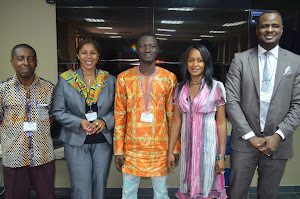BY EDMUND SMITH-ASANTE
 |
| Participants in a group picture |
About 70 participants from Ghana, Liberia, Nigeria,
Sierra Leone and The Gambia are meeting in Accra, Ghana, for three days of
deliberations on household water treatment and safe storage (HWTS) strategies for the West Africa sub-region.
Participants are key national and regional government
officials and specialists from identified ministries that address HWTS such as
health, water or equivalent, public works, education, WHO and UNICEF among
other stakeholder organisations.
The workshop, which began Monday, May 6, 2013, is
being held under the theme “Scaling-up HWTS -
National policy environment and integration strategies” and will focus on how
participating countries can double their efforts to scale up the implementation
of household water treatment and safe storage.

















